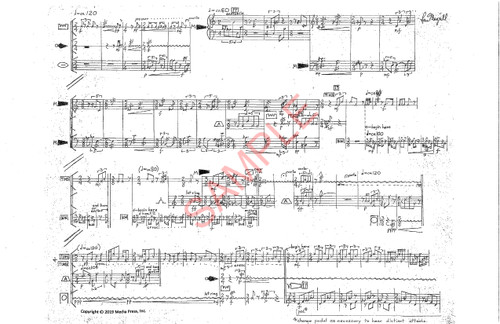Includes score. Three scores needed for performance.
Print size: 11 x 17"
Review from Percussive Notes (2021):
Structure
Sam Magrill
Composed in 1973, “Structure” is one of Sam Magrill’s earliest works. Written as small overlapping and interrupting atonal ideas, each player juggles performing on a variety of instruments to assemble a dense collage throughout the piece, with only a few moments of isolated incidents to break the piece into sections. Tempo changes occur semi-frequently and without warning, adding to the difficulty of performance. Cohesion is created by repeating rhythmic motives as well as recurring melodic fragments. For example, the opening marimba solo is transposed for the vibraphone toward the end of the work and thus, along with the same opening and closing guiro pattern, creates a nice arc for the trio.
Atonal and lacking rhythmic stability, “Structure” for three percussionists exists as a cacophony of keyboard and accessory instruments grouped together via motivic fragments dispersed amongst the ensemble. Throughout various moments, different players perform in different tempi, rupturing any semblance of unity that may be created in any given phrase. Although the piece has elements reminiscent of Mauricio Kagel or Karlheinz Stockhausen from the Darmstadt School, it seems unrelated to Boulez’s “Structures 1” or integral serialism.
The score poses some challenges for the performers, although not enough to warrant avoidance of the piece. Available as a slightly grainy photocopy of the original manuscript, “Structure” is published in score form only with no parts included. The sample included on the publisher’s website is a good illustration of what performers can expect. At five minutes in length, this volatile trio brings back the avant-garde aesthetic of the 1950s and ’60s, suited for seniors or graduate students looking to branch out of the traditional cannon.
—Matthew Geiger







